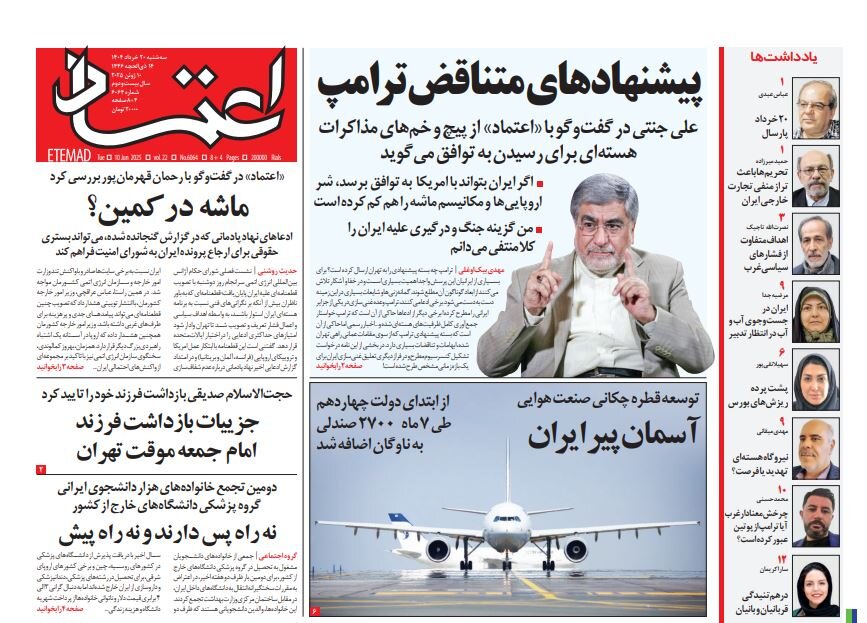TEHRAN – In an interview with former Foreign Ministry spokesman Ramin Mehmanpalast, Etemad discussed Europe’s position on Iran’s nuclear issue.
He said: Today, Europeans face a series of challenges in relations with the United States. Issues revealed on issues such as war in Ukraine, the status of NATO, and trade tariffs. Europeans have been one of the major parties in nuclear deals with Iran in the past, but in recent years they have been somewhat affirmed in the decision-making process. In these circumstances, Europe is striving to revive its role and position. Efforts to issue resolutions against Iran at the International Atomic Energy Agency’s Board of Directors are part of this strategy. The US has announced that it will not support the resolutions that will cause tensions on the board as long as negotiations with Iran continue, but these European actions can also be interpreted as not only with Washington’s tacit consent, but they are also interpreted as being in line with the US policy of applying maximum pressure on Iran.
Javan: Grossi is a lever for issuing resolutions
In the memo, Javan discussed various approaches by Rafael Grossi, director of the International Atomic Energy Agency. It writes: The Director-General of the International Atomic Energy Agency made a series of claims about Iran’s nuclear program in another approach that is considered a green light to issue resolutions (snapback mechanisms) against Iran. These statements effectively issue strong resolutions and hold ways to refer to the UN Security Council. Of course, Foreign Ministry spokesman Esmaeil Baghaei said that the snapback mechanism should not be exaggerated as nuclear work is peaceful and there is no legal excuse, reason or basis to not rule out Iran’s nuclear issues from the Security Council’s agenda in October 2025, and the conversely adopted actions are political and politicized litigation on the other side, so there is no legal excuse, reason or basis.
Sobh-e-no: enemy’s social engineering strategy
In the commentary, Sobh-e-no dealt with the murder of a young girl in Tehran and the abuse of an opposition case. This paper is about the time of hybrid wars and complex psychological operations, and the enemies of Iran’s Islamic Republic harness the cultural sensibility of our society to create chaos and instability. The key point here is that opposition is leveraging the issues of women in Iran and Islamic culture for influence. Hostile media are trying to turn individual cases into public crisis, knowing that women’s issues are a red line for Iranians. They are trying to turn murder into a lever of pressure, but dozens of women in America and Europe are becoming victims of violence, but have not attracted media attention. The political exploitation of the murder of young girls is not a new act. However, the aspects of the problem must be explained to everyone, and the various views of women in Iranian society must be explained to everyone. In that case, the enemy must not enjoy the idea of exploiting such calamities to attack the Iranian country.
Ettelaat: Perhaps the sixth round will be the final dialogue between Iran and the US!
Ettelaat spoke to international affairs analyst Hassan Hanizadeh about Trump’s unstable behavior during nuclear talks. He said: Donald Trump’s double action on Iran’s nuclear file shows that the US does not seek to reach a fair and victory agreement with Iran. For this reason, Trump has sought to be skeptical of public opinion about Iran’s activities. Five rounds of talks have been held between the two countries, with Americans claiming to halt the enrichment cycle. We are ready to negotiate an enrichment of about 3.67% under the supervision of the International Atomic Energy Agency, but the Americans’ obstruction continues. So perhaps the sixth round will be the final round of consultations between Iranians and Americans. The influential lobby of the Zionist regime must admit that the White House does not allow it to accept the continued enrichment of Iran. Of course, we should not ignore the fact that military options have generally been removed from the US agenda. Therefore, perhaps an enrichment of Iran at 3.67% under agency supervision could lead to interactions, and thus to the end of the conflict.

